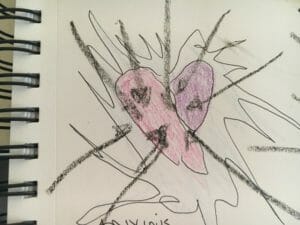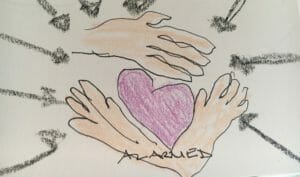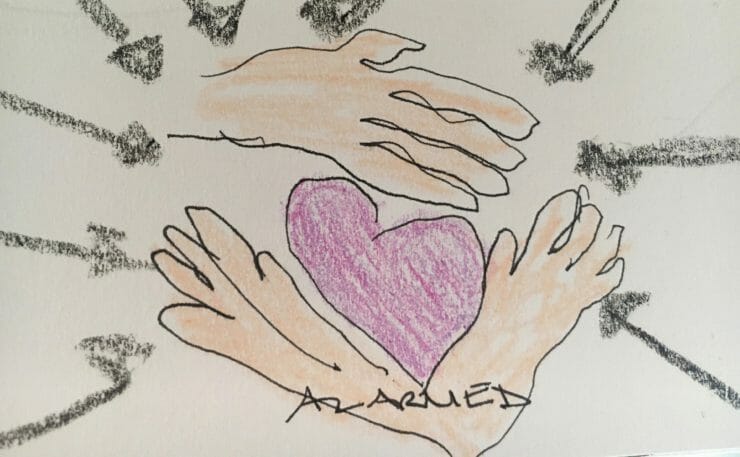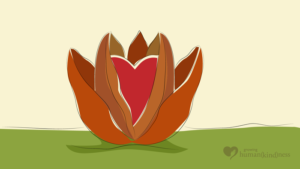Here at the tail end of a two year pandemic, in a time of so much polarization, and now, the tragic horror of another war, I imagine that many of you are feeling the collective anxiety and fear that’s been running through our shared, human nervous system.
And if you’re a highly sensitive person, or someone who feels deeply, you may have your own personal well of worries that have been thrumming through your body.
In the wake of this anxiety, you may have noticed that your self soothing behaviors – like overeating – have also increased. This has been so common for so many of us.
We’re wired to seek connection and holding
When we feel overwhelmed by fear, we’re wired to seek refuge in our support systems, to look for holding and support. We may find ourselves using strategies like food to soothe and numb, to bring our nervous systems some rest.
This drive for ‘holding’ is rooted in love, and full of dignity.
Anxiety isn’t often held in dignity. It’s so painfully uncomfortable to feel. It can feel crippling and paralyzing.
And it’s often seen as something we ‘should get over’ or ‘stop doing.’ I remember stepping into a therapist’s office once, and spying a magnet on her filing cabinet with a well known quote about how worrying empties us of our strength.
While on one level, the quote is true – and I imagine well meant – as someone who arrived at her office with a full plate of worries, I remember feeling a crush of tightness running up and down my body as I saw the magnet, a felt sense that I needed to cover over my fears.
It felt like there was no room to share the anxiety that troubled me.
Moving from ‘anxious’ to ‘alarmed’
 And that’s what anxiety needs to flow, and to move: room. The mentor that taught me this is developmental psychologist Dr. Gordon Neufeld.
And that’s what anxiety needs to flow, and to move: room. The mentor that taught me this is developmental psychologist Dr. Gordon Neufeld.
For starters, he said it’s helpful to use a different word when we talk about anxiety: for to feel anxious means that we’re feeling alarmed.
Saying that ‘we’re feeling alarmed’ is a more accurate – and compassionate – description of what we’re feeling.
To give us a taste of this, he had us compare how we felt when we used these two words, side by side. First, he had us pause and bring up the word ‘anxiety’ in our bodies, and to notice what we felt. Then he had us bring up the word ‘alarmed.’
When I first did this exercise, I felt tears in my eyes. When I used the word ‘alarmed,’ I felt open, tender, soft, and empathetic for the ways I felt alarmed. I noticed a feeling of caring arose in my body – a feeling of tend and befriend.
for the ways I felt alarmed. I noticed a feeling of caring arose in my body – a feeling of tend and befriend.
There’s a way my experience made sense: Oh, sweetheart: you feel alarmed.
When I used the word ‘anxious,’ my body felt tight and contracted. “Anxious” felt disconnecting, rather than connecting.
My body felt judged, as in, “Stop being so anxious. There’s nothing to be anxious about.”
I felt anxious about feeling anxious. I wanted to hide, or pretend.
You can try this for yourself. What arises in your body when you use the word ‘anxious’ to describe your experience? Now use the word ‘alarmed.’ What do you notice?
Our words matter
This exercise demonstrates how much our words matter. They can invite us in, to want to connect and offer help, or they can contract us in shame and self loathing. They can bring us together, and they can pull us apart. They can inspire care, and they can create withdrawal.
And the words we use can offer invitation or shut down.
What helps soften alarm
When we’re feeling alarmed, we need a couple things.
First, we need resonance, not reassurance, as Sarah Peyton reminds us. Our alarm needs to be acknowledged. Calling anxiety what it is – “I’m feeling alarmed” – is one way we can offer ourselves reassurance.
I find that when our alarm is acknowledged, this acknowledgement of what is true – you’re feeling so alarmed and worried right now – in and of itself helps lower the alarm we feel.
We need ways to empty the alarm that lives in our bodies, to drain what frightens us.
If you eat when you feel anxious, you’re already intuitively doing this – there’s a way you’re trying to bring your body to a place of more ease (even if the food doesn’t quite work, or brings its own pain.)
Reframing overeating in this way can be very helpful – to recognize that our bodies and brains are already trying to move us in a helpful direction.
They just may need a little help! We can help our instinct to ‘drain the alarm’ by steering it in another direction.
Here are some ways to get you thinking, common ways we already drain alarm. When you think of draining alarm, think movement – moving the intense energy of alarm in some way. I also find it helpful to turn ‘worry into ritual,’ as my friend Kristin says, to turn the energy of alarm into some form of nurturing or care.
For example:
- vigorous physical play or exercise
- listening to music with a lot of energy
- dancing
- a soothing bath
- rhythmic movement (rocking or swinging)
- a bike ride
- cuddling pets
- caring for something (watering plants, sewing on a button, chopping vegetables, taking a dog on a walk)
- and taking on a physical or organizing task (like organizing the cupboards, moving the lawn or cleaning out a closet) are all ways you can drain alarm that don’t involve food.
Having a kind, empathetic listener – a friend, loved one, listening partner, or therapist – where you can pour out your heart, without advice or fixing, is a wonderful way to meet both needs: a need for empathy/resonance/acknowledgment and a need to drain the energy of alarm.
There can be so much we feel worried about
There is so much we can feel worried about!
I wonder: what if we took a moment and acknowledged how alarming these past two years have been?
Maybe you’ve been worried about your children’s schooling as you were schooling at home; maybe you’ve been apart from loved ones. Maybe you’ve struggled with the isolation and have felt more depressed. Maybe you’ve had a chronic lack of energy that has you worried.
See how it feels to take a moment to pause and to notice all the ways you’ve felt alarmed. You may be surprised by how this acknowledgment makes you feel less alarmed, not more.
Anxiety asks for kindness and respect
Anxiety seems to be a part of being human, part of living in a mortal, vulnerable body. And if you’re sensitive and feel keenly, you may feel – or notice – more of this emotion within.
In making room for this aspect of being human, anxiety asks for our patience, and respect. It’s also the cradle of these things: what grows and births them within us.
So often, the ones who need the most care in our society – like the young, the old, and the ill – are also the most vulnerable and the most prone to feeling alarmed. Bless them, for they are our tutors: they teach us how to slow down, how to attune to what’s here, and how to soften our frustration and make room for their feelings.
Being in a relationship with alarm – and anxiety – deepens our compassion, our capacity to be with the more vulnerable, fragile, and tender aspects of life with dignity and reverence.
And making room for alarm makes us kinder. It helps us be kinder to the alarm in our own nervous systems, and kinder to the alarm we notice in others. And it helps us be kinder to the messy ways we may care for it, like self soothing in food.
Bless these ways alarm brings us home.
A fun exercise to try and a note about the images with this article:
I’m currently studying with a beloved mentor, Bonnie Badenoch, in a year long intensive on IPNB, interpersonal neurobiology.
Bonnie had us do an exercise where we used our non-dominant hand to draw our response to a pair of words. In this post, you can see the pictures I drew for the words ‘anxious’ and ‘alarmed.’
In the word ‘anxious,’ the arrows of life go directly into the heart. In the word ‘alarmed,’ a circle of hands buffer the heart from the arrows.
You can try this exercise for yourself and see what arises when you draw your response to the word anxious, and your response to the word alarmed. What do you notice, and feel?

